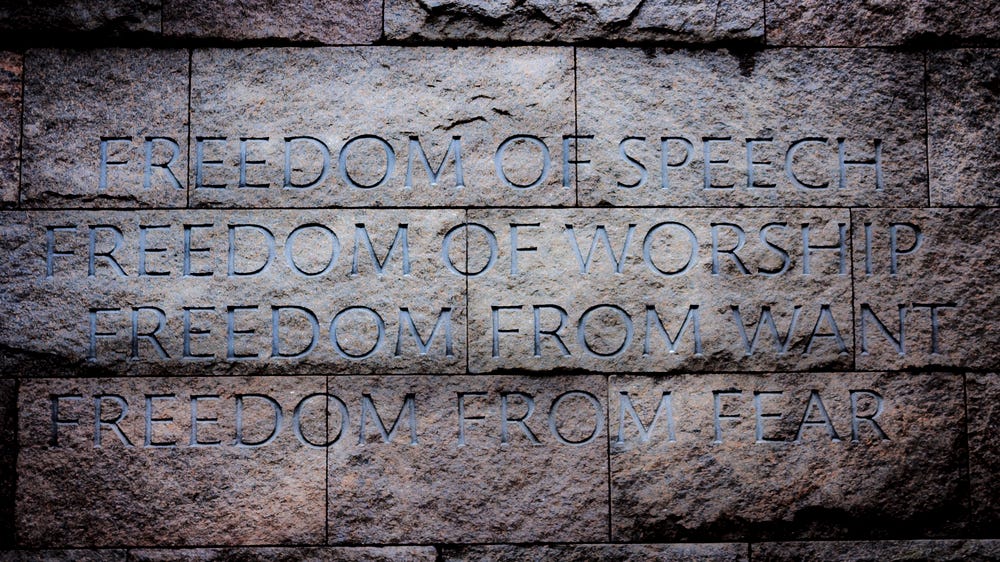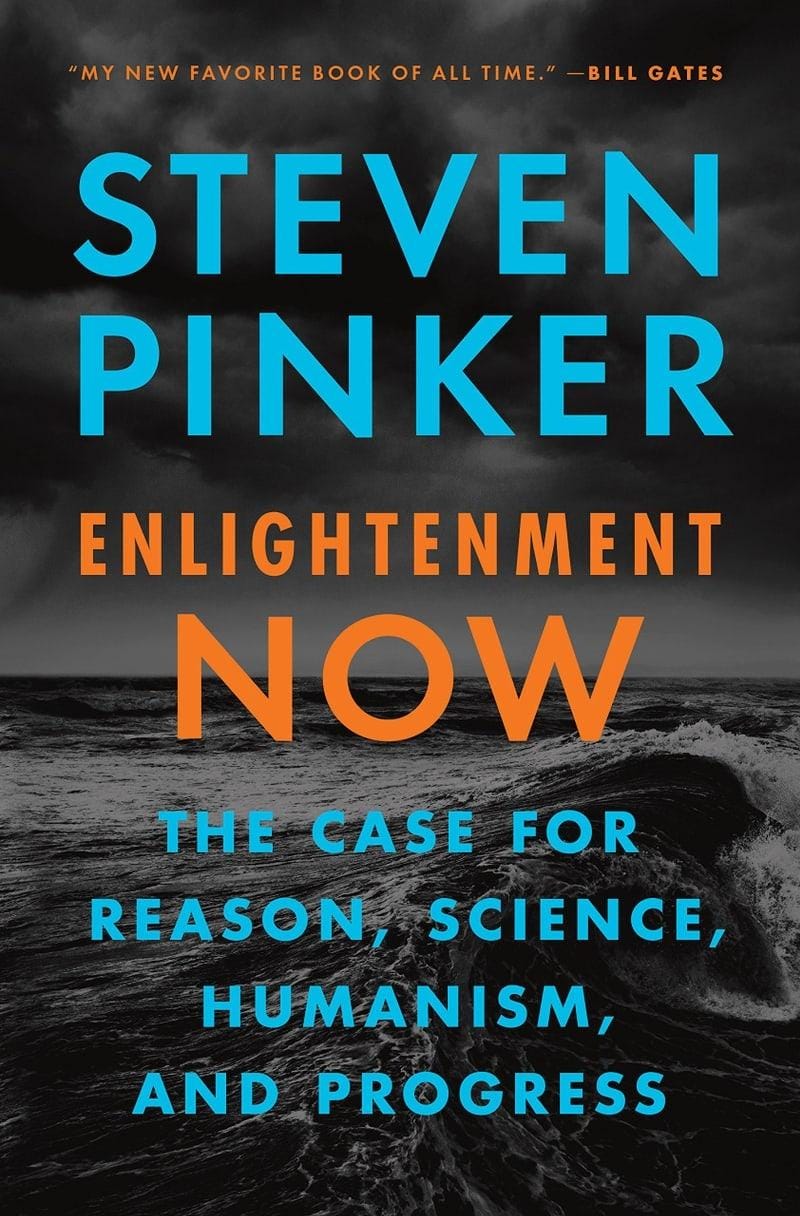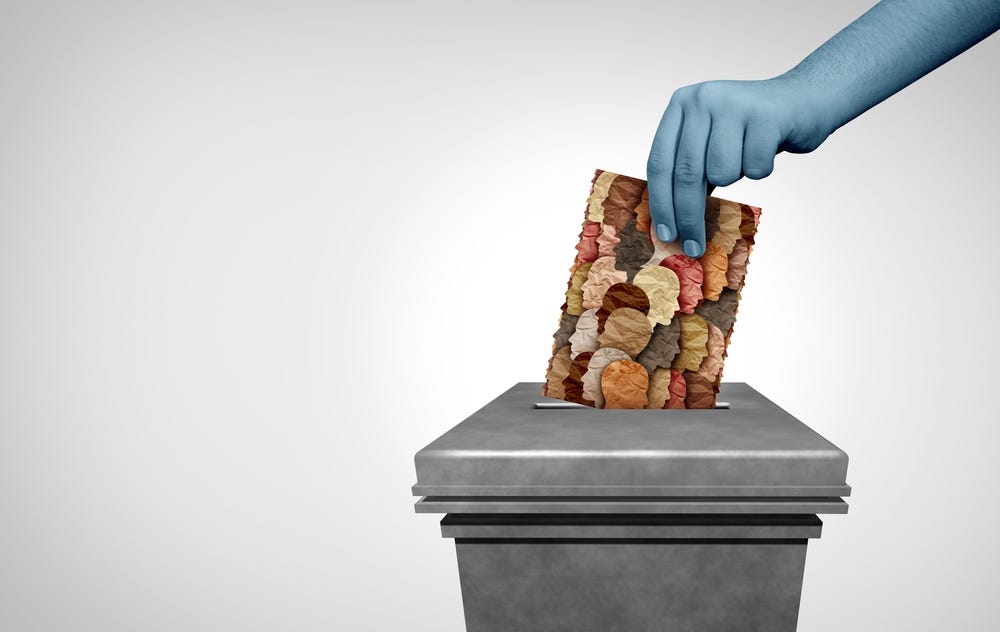E-Pluribus | August 19, 2022
Where the free speech rubber hits the road, a call for a new and improved Enlightenment, and Democrats face reality on racial politics.
A round-up of the latest and best writing and musings on the rise of illiberalism in the public discourse:
George Packer: Free Speech Can’t Survive as an Abstraction
People who speak out in defense of unpopular or offensive speech are sometimes thought of as brave, and for good reason in light of today’s illiberal trends. But at The Atlantic, George Packer writes about those who literally put their lives on the line in the recent Salman Rushdie attack, and not just Rushdie himself. Values can’t just be words - actions still speak louder.
Reese didn’t want to discuss the attack with me; he preferred to talk about the values that had brought him and Rushdie together in Pittsburgh and then Chautauqua. But it became clear why Rushdie is alive. Reese is home in Pittsburgh recovering from a fairly superficial knife wound to his eyelid, which he sustained while holding down the legs of the man stabbing the novelist. At that same moment, audience members climbed onto the stage and subdued the attacker while the knife was still delivering savage thrusts. Judging from videos, these rescuers were white-haired men in shorts—the kind of people you normally see at Chautauqua. A retired doctor from Pittsburgh who is a supporter of City of Asylum attended to Rushdie onstage. Running toward the mayhem took courage.
All kinds of people show bravery in a crisis, and perhaps Rushdie would have been saved anywhere. But he was saved last Friday by members of two communities with similar values—one devoted to the open exchange of ideas, the other to freedom from persecution. “This is a very bold attack against the core values of freedom and ways of resolving differences short of violence, with art, literature, journalism,” Reese said. He experienced the assault as an intense embodiment of the kind of persecution that brings writers to City of Asylum. “It’s given a very visceral, momentary connection to me personally, and certainly to Salman, it’s probably never gone away in the back of his mind—but now it’s caught permanently, in a physical way.”
Read the whole thing.
Robert Tracinski: Enlightenment 2.0
At Symposium, Robert Tracinski takes a look at Steven Pinker’s book Enlightenment Now. Tracinski believes that despite advances in reason, science and free inquiry, the original mission of the Enlightenment remains unfulfilled and could benefit from a reboot. While Tracinski is not completely sold on Picker’s approach, he says Enlightenment Now does a good job of focusing on what’s right in the modern world, a road less travelled these days.
An understanding and defense of rationality is crucial to the defense of liberalism. The whole premise of a free society is that we should make our decisions on the basis of discussion, persuasion, debate. But this implies that there is something to talk about, that evidence and logic will and should change minds. And it requires a confidence that this reasoning will lead to answers—to valid conclusions that, when acted upon, will improve human life.
Defenders of the intellectual legacy of the Enlightenment have done some excellent work in recent years to show us, from real-world results, that all of these propositions are true. Steven Pinker’s Enlightenment Now exhaustively showed the massive improvement of the human condition, both materially and spiritually, that has resulted from the embrace of reason, science, free inquiry, and persuasion.
[ . . . ]
The defense of Enlightenment values cannot assume that we can simply return to a firm and stable status quo ante. The Enlightenment’s defense of reason was incomplete and has since been encrusted with two centuries of philosophy that was often motivated by a desire to preserve certain beliefs that would not withstand the scrutiny of reason. The reason Wittgenstein could propose that common concepts like “game” were incapable of definition and people just accepted this reflects the fact that there were many people who really wanted to escape the restrictions imposed by clear definitions, and they were just looking for an excuse.
I have heard some recent talk about the idea of “Enlightenment 2.0,” a conscious attempt to create a new Enlightenment with new institutions for the dissemination of knowledge. What I especially like is the idea of thinking of this as a second, revised edition of the Enlightenment, with new attempts to place the defense of rationality on a firm philosophical foundation and clear away previous attempts that undermined our understanding of reason.
Read it all.
Seth Moskowitz: Democrats Have Started to Retreat on Racial Politics
While probably few Democrats would be willing to voice it openly, Seth Moskowitz writes at Discourse Magazine that the party seems to have gotten the message that the racial politics so popular among woke activists is considerably less popular with voters.
The institutions of the American left—the Democratic Party, activist organizations, universities and the media—broadly embraced and adopted this form of racial politics. For instance, the Democratic Party’s 2020 platform trumpeted that the party would “take a comprehensive approach to embed racial justice in every element [emphasis added] of our governing agenda,” illustrating just how foundational these new ideas about race had become to the party. Recently, however, an important split has gone unnoticed: As most progressive institutions continue their leftward trudge on racial politics, the Democratic Party has reversed course, inching back to more mainstream and popular ground.
The Democratic Party was never going to make a clean break from racial politics, since an outright repudiation of the philosophy would have led to fury from the party’s left flank. So instead, the retreat has been subtle and delicate.
Think back to the 2020 Democratic presidential primary, when candidates were tripping over one another in their rush to the left on issues of race….
Today… racial politics are playing an astonishingly small part in Democratic midterm election primaries. Rather than devoting time to issues of race and identity, Democratic candidates this year have focused on a different host of issues—abortion, gun control, the economy and jobs—and have all but abandoned the preoccupation with race that dominated the 2020 presidential primary. These days, one could watch hours of Democratic ads and not find a single reference to the racial issues that dominated their messaging in 2020.
Read it all here.
Around Twitter
Via the Foundation Against Intolerance & Racism (FAIR), an eclectic group is gathering to stand up for Salman Rushdie:
David French takes Florida’s Governor Ron DeSantis to task for the state’s Stop WOKE act that DeSantis has championed:
The CEO of the Foundation for Individual Rights and Expression and the ACLU on the same page? What is the world coming to?!











